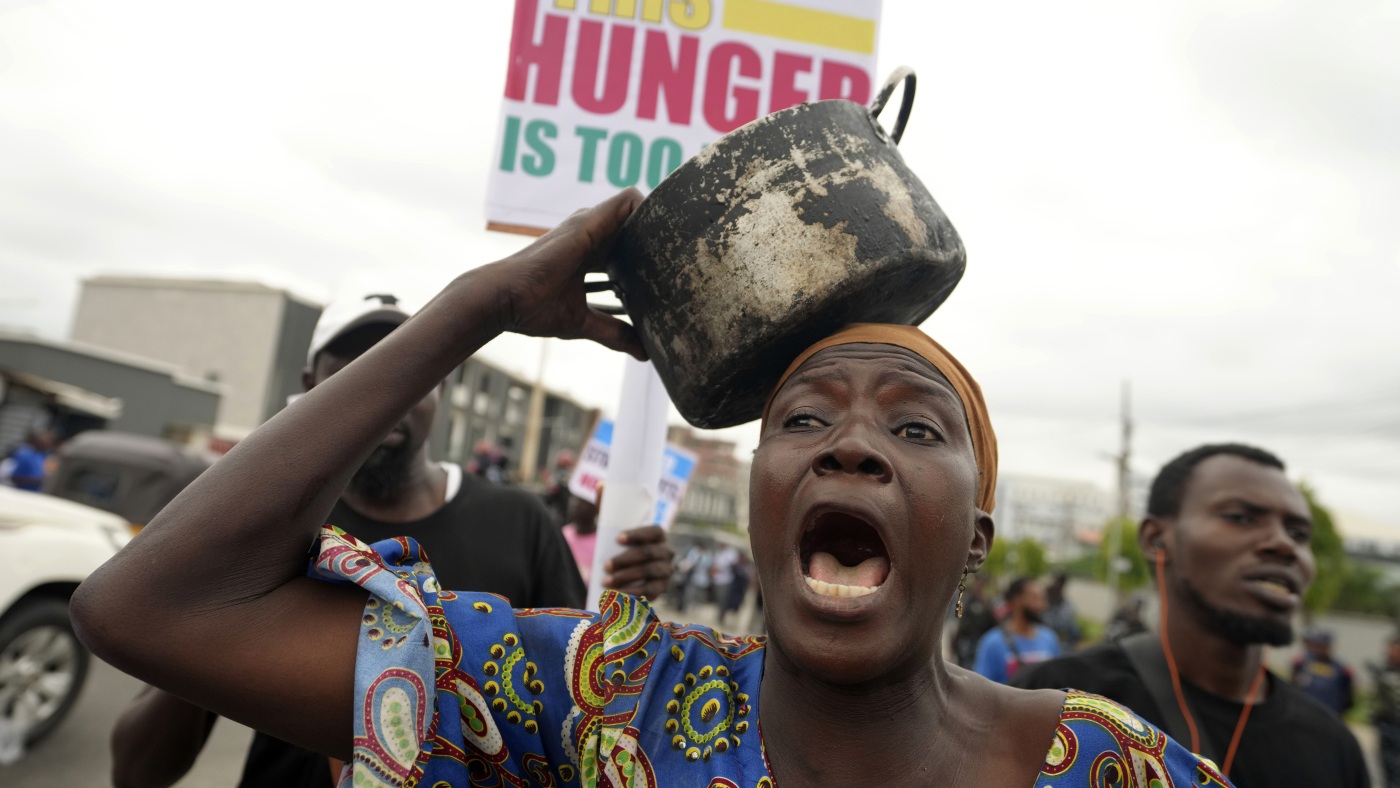A woman protest against hardship on the street of Lagos, Nigeria, Thursday, Aug. 1, 2024. Thousands of mostly young people poured onto the streets across Nigeria on Thursday as they protested against the country’s worst cost-of-living crisis in a generation. Security forces fired tear gas to disperse some of the protesters in the capital, Abuja.
Sunday Alamba/AP
hide caption
toggle caption
Sunday Alamba/AP
LAGOS, Nigeria – Thousands of protesters have gathered in several Nigerian cities, in organized nationwide demonstrations against the rising cost of living and bad governance. A brutal combination of unprecedented fuel prices, high food inflation, rising electricity tariffs a collapse in the value of the naira, has led to one of the worst economic crises for decades in Africa’s most populous country.
On Thursday, police fired teargas at hundreds of protestors in the capital, Abuja, who gathered at Eagle Square a public space near the city-center. In several cities in northern Nigeria, demonstrations which are planned to continue for 10 days, have met a heavy police presence. In Kano, a populous city in northern Nigeria, anti-government protestors forced their way into government buildings.
In Lagos, much of the city usually bustling with activity and traffic, was eerily quiet, with several shops closed, and a larger police and military presence visible across the city. On Thursday, close to a thousand demonstrators gathered at a main expressway in Ketu, a commercial hub in Lagos, defying police orders to move into a designated area. Ibrahim Suleiman, a trader in Lagos, held a placard reading “end bad governance” and “hunger is killing us”.
“I’m here to fight for my rights. My children don’t go to school, we can’t afford it anymore,” he said. “We’re hungry. A can of beans is 2,200 naira ($1.32) garri is 4,000,” he said referring to a common staple made from cassava, that has more than doubled in price this year.

People protest against hardship on the street of Lagos, Nigeria, Thursday, Aug. 1, 2024. Thousands of mostly young people poured onto the streets across Nigeria on Thursday as they protested against the country’s worst cost of living crisis in a generation. Security forces fired tear gas to disperse some of the protesters in the capital, Abuja.
Sunday Alamba/AP
hide caption
toggle caption
Sunday Alamba/AP
For weeks Nigerian government ministers, lawmakers, governors and police and security chiefs have tried to prevent nationwide protests from taking place, warning against demonstrations similar to protests held inKenyaover the last month. Officials urged for patience, offered concessions and made threats, sparking criticism from civil society groups.
Nigeria’s economic crisishas deepened over the last year since the government elected in May 2023, adopted a series of economic reforms. It removed a controversial fuel subsidy and loosened currency controls. The reforms were praised by bodies like the IMF and World Bank, and economists who argued they were painful but necessary. But the impact of the policies has been severe for millions, exacerbating poverty and leading to near unprecedented rates of malnutrition and food insecurity according to aid groups.
Inflation has soared to 34 percent, the highest annual rate in almost 30 years, and food inflation at 40 percent. Rising insecurity in northwest and central Nigeria has also displaced farmers from their farmland, leading to rising food prices.
In recent weeks, Nigeria’s government has distributed food aid, often locally referred to as “palliatives” such as bags of rice, sent to various communities to help the vulnerable. Some Nigerian states have also sold rice at subsidized costs.

A man protest against the country’s worst cost-of-living crisis in Lagos, Nigeria, Thursday, Aug. 1, 2024.
Sunday Alamba/AP
hide caption
toggle caption
Sunday Alamba/AP
But the schemes which are widely held as inefficient and only reach a small fraction of those in need, have provoked anger. 29-year-old Samuel Ali at the protest in Lagos said, “We don’t need palliatives, we’re not beggars. All we want is good governance and jobs. Allow us to work and earn money. “Rice spoils. Garri spoils. We don’t want your food, we want a better country – enough is enough! ”
On Monday, President Bola Tinubu signed a new minimum wage into law, doubling it to 70,000 naira ($42), after months long negotiations with Nigeria’s labor unions. Yet many of the country’s more than 200 million people are either self-employed or without jobs, and a number of Nigerian states have said they will be unable to pay the higher wage. Many also feel it doesn’t go far enough.
